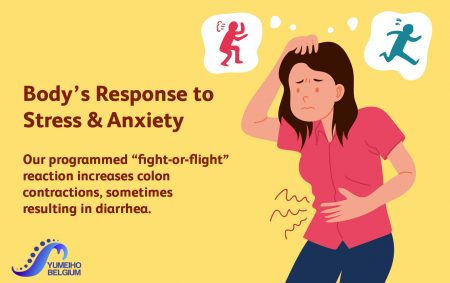How stress affects our bodies
Stress is a feeling of emotional or physical tension. It can come from any event or thought that makes you feel frustrated, angry, or nervous. Stress is your body’s reaction to a challenge or demand. In short bursts, stress can be positive, such as when it helps you avoid danger or meet a deadline.
Find out what are the side effects, and what are the changes produced in our bodies.

Nervous system
When stressed – physically or psychologically- the body suddently shifts its energy resources to fighting off the perceived threat. In what is known as „fight or flight” response, the sympathetic nervous system signals the adrenal glands to release adrenaline and cortisol.
This hormones make the heart beat faster, raise blood pressure, change the digestive process and boost glucose levels in the bloodstream. Once the crisis passes, the body systems usually return to normal, but not every time.
Musculoskeletal system
Under stress, muscles tense up. The contraction of muscles for extended periods can trigger tension headaches, migraines and various musculoskeletal conditions. We will talk more about this in a future article.
Respiratory system
Stress can make you breathe harder and cause rapid breathing – or hyperventilation – which can bring on panic attacks in some people.
Cardiovascular system
Acute stress – stress that is momentary, such as being stuck in traffic – cause a increase in heart rate and stronger contractions of the heart muscle. Blood vessels that direct blood to the large muscles and to the heart dilate, increasing the amount of blood pumped to these parts of the body. Repeated episodes of acute stress can cause inflammation in the coronary arteries, thought to lead to heart attack.
Endocrine system
Adrenal glands
When the body is stressed, the brain sends signals from the hypothalamus, causing the adrenal cortex to produce cortisol and the adrenal medulla to produce epinephrine – sometimes called the “stress hormones”.
Liver
When cortisol and epinephrine are released, the liver produces more glucose, a blood sugar that would give you the energy for „fight or flight” in an emergency.
Gastrointestinal system
Esophagus
Stress may prompt you to eat much more or much less than you usually do. If you eat more or different foods or increase your use of tobacco or alcohol, you may experience heartburn or acid reflux.
Stomach
Your stomach can react with “butterflies” or even nausea or pain. You may vomit if the stress is severe enough. Ulcer is also a condition that can be caused by stress.
Bowels
Stress can affect digestion and which nutrients your intestines absorb. It can also affect how quickly moves through your body. You may find that you have either diarrhea or constipation.

Reproductive system
In men, excess amount of cortisol, produced under stress, can affect the normal functioning of the reproductive system. Chronic stress can impair testosterone and sperm production and can cause impotence.
In women stress can absent or irregular menstrual cycles or more painful periods. It can also reduce sexual desire.


Hi
I am a little confused about how left or right hip dislocations are characterized by the sympathetic or parasympathetic nervous systems. I have been looking for the answer but unfortunately, it seems that there is no scientific evidence besides clinical observations. I have passed Yumeho therapy courses but the question is still there. I was wondering if someone could help me
Bests,
Hesam
Hello!
Thank you for your interest on our website.
There is a strong connection between the pelvis dislocation and the the vegetative nervous system. I invite you to our Centre for a discussion about this and more, if you are interested. Just let us know!
Best regards,
Marian Sârbu, PhD(s)
5 DAN Yumeiho Teacher
Yumeiho Belgium
http://www.yumeiho.be
contact@yumeiho.be
+32 468 59 76 91